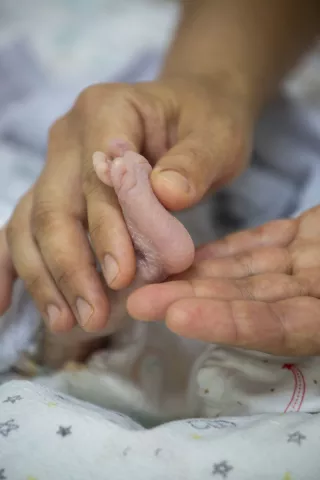HPV vaccination across generations
Nargiza received her first HPV vaccine shot at her school in Tashkent city when she was 16.

Nargiza received her first HPV vaccine shot at her school in Tashkent city when she was 16. At the time a doctor visited her school to tell her and other students that the vaccine would protect them from cancers and assured them of its safety.
“I remember there were rumours that your fertility could be impacted, but I understood that the purpose of vaccines is to prevent disease,” Nargiza said. “I had no doubts about receiving the shot.”
Nargiza disregarded myths and put her faith in scientific facts. After receiving her dose she had a mild headache, which is a common side effect and a small sacrifice for immeasurable peace of mind.
Now aged 26 and still living in Tashkent, Nargiza is making sure her whole family is guarded against preventable illness, through vaccines given to her children at the prescribed ages. While her daughters aged 2 and 4 aren’t ready to have the HPV vaccine, they have received all their other vaccinations in good time with few side effects.
Nargiza is creating a lasting tradition of vaccination in her family. Here she advocates that vaccines protect against preventable illnesses such as COVID-19, and against the human papillomavirus (HPV). While misinformation still abounds about vaccines and their side effects, she knows they exist only to protect people’s health and well-being.
Nargiza’s commitment to protecting herself and her children is mirrored in her family. Her mother works at a polyclinic and is dedicated to promoting immunization and preventing vaccine hesitancy both at home and in the broader community. All girls in Nargiza’s family receive their HPV vaccine shots at the right age.
For this family and many more in the city and beyond, vaccination against HPV, COVID-19 and many other viruses and illnesses is considered a duty not just to one’s own health and well-being, but to the entire community. Alongside good diet and lifestyle, and being proactive about healthcare, proper vaccination is a simple way to ensure a long and happy life.

Battling illness and misinformation
Despite the HPV vaccination’s critical importance in guarding against life-threatening cancers and the proven safety of these and all other vaccines in medical use, a phenomenon of “vaccine hesitancy” remains. This fear of accepting a vaccine is founded on misinformation and myths, which are dangerous to the individual, the community and to countries as a whole.
UNICEF and our national partners are fully committed to bridging these gaps.
In addition to establishing ‘cold chains’ that ensure vaccines stay at optimal temperatures during shipping, storage and delivery to hospitals, UNICEF and the Ministry of Health are taking vital steps to ensure every eligible citizen receives all the vaccines they need.
UNICEF, together with WHO and the MoH, works to raise public awareness of vaccine-preventable diseases. Partner organizations have developed a range of informative materials to support healthcare providers in communicating with parents and caregivers. Those materials help medical staff answer frequently asked questions.
Moreover, TV shows, radio programmes and PSAs aired through national and regional channels, encourage parents to trust immunization services and protect children from preventable diseases.
UNICEF is committed to ensuring all Uzbek citizens are empowered and informed to vaccinate themselves against the HPV and COVID-19 viruses, and against all other preventable illnesses.
“Vaccines train our bodies, train our immune systems to be ready to fight illness. This is what I tell people who don’t want to get vaccinated,” Nargiza concludes. “All people should vaccinate their children and themselves. It’s our best protection.”




